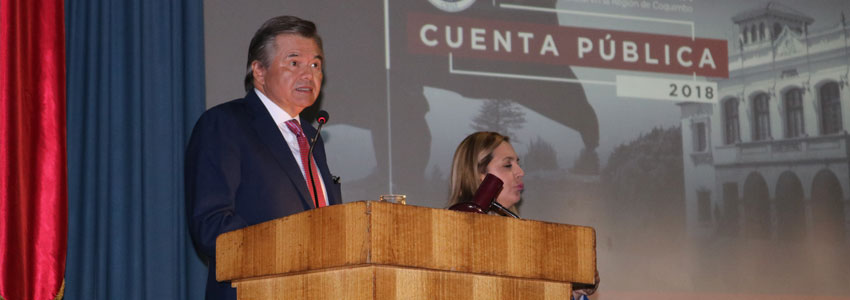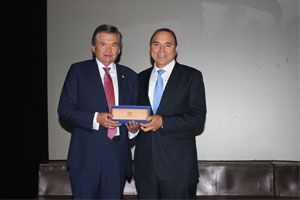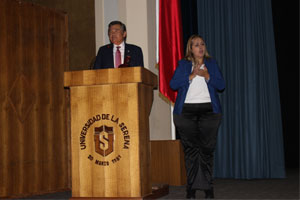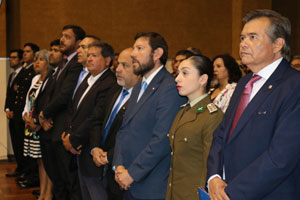- News
Former UFRO Rector analyzed the new higher education reform at the inauguration of the 2019 Academic Year

Professor Sergio Bravo gave a master class within the framework of the thirty-eighth institutional anniversary, in the presence of authorities, academics, officials and students.
During 2018, two important reforms were launched that involve profound changes in the institutional processes of national universities, mainly related to the state and public sector. The topic was analyzed in a master class given by the former Rector of the University of La Frontera, Professor Sergio Bravo, who referred to the threats and opportunities that these new regulations facing higher education entail.
 In his speech, the former university authority emphasized the necessary updating of the way in which institutional work is carried out, considering the new political, economic and technological scenario. “Promoting social and technological progress and, simultaneously, avoiding the possibility of renewal, can no longer be perpetuated. It is evident the transformations that the universities themselves have induced, and that they are exerting powerful pressure that has forced these institutions to reexamine their conception, operation and viability (…) The current levels of uncertainty prevent us from doing what we did 50 years ago”, express.
In his speech, the former university authority emphasized the necessary updating of the way in which institutional work is carried out, considering the new political, economic and technological scenario. “Promoting social and technological progress and, simultaneously, avoiding the possibility of renewal, can no longer be perpetuated. It is evident the transformations that the universities themselves have induced, and that they are exerting powerful pressure that has forced these institutions to reexamine their conception, operation and viability (…) The current levels of uncertainty prevent us from doing what we did 50 years ago”, express.
In this way, he urged to look critically at the internal processes that each institution entails, taking into consideration the abyss that the changes in the technological and economic area have reached in the world of education. “These conditions have put enormous pressure on universities and their training programs, since our institutions are obliged to take on the task of thinking about the requirements of a 25-year-old young man, whose professional life will be projected until at least the year 2060. This means thinking today about the knowledge, skills and abilities that will contribute to its success and validity for the next four decades,” he said.
 On the other hand, added to these changes are the transformations that the way of teaching and learning has undergone in the hands of technological advances, which have influenced the information consumption habits of students and teachers. “Experts insist on considering digital technologies as the most powerful tools in an effort to provide quality university education. Not only because of the possibilities it offers, but because they constitute the educational habitat of the XNUMXst century. And I wonder if we are designing policies in this sense? ”He analyzed.
On the other hand, added to these changes are the transformations that the way of teaching and learning has undergone in the hands of technological advances, which have influenced the information consumption habits of students and teachers. “Experts insist on considering digital technologies as the most powerful tools in an effort to provide quality university education. Not only because of the possibilities it offers, but because they constitute the educational habitat of the XNUMXst century. And I wonder if we are designing policies in this sense? ”He analyzed.
In this context, the professor explained that universities on an international scale have taken on these challenges by reducing the contents and generating short degrees, paying attention to innovation and continuous updating programs, linked to the research projects developed by the respective institution.
Regarding the obligations that pertain to the accreditation processes, he highlighted that the new laws seek to achieve uniformity in all the processes that affect higher education institutions. “We must understand the background that underlies these regulations and what the legislator expects with respect to higher education in Chile, which is ultimately to organize the system, and that every institution presents within itself a certain homogeneity of quality in its take action in all areas,” said Professor Bravo.
 Finally, he referred to the importance of carrying out these processes in a shared manner and supported by his institutional peers. “Today we are facing a new challenge, which is to take the stage of the new laws already mentioned and that can be a threat to the future if they are not taken with the due responsibility of the entire university community. The ULS can and should do so with the greatest optimism, since it has everything to be a great university, due to its heritage, history, tradition, its riches and privileged natural environments. The development processes of institutions like ours cannot be done alone and I hope that the UFRO and the University of La Serena join forces with a long-range collaboration agreement in all areas, in which each institution can learn from the another”, concluded the expert.
Finally, he referred to the importance of carrying out these processes in a shared manner and supported by his institutional peers. “Today we are facing a new challenge, which is to take the stage of the new laws already mentioned and that can be a threat to the future if they are not taken with the due responsibility of the entire university community. The ULS can and should do so with the greatest optimism, since it has everything to be a great university, due to its heritage, history, tradition, its riches and privileged natural environments. The development processes of institutions like ours cannot be done alone and I hope that the UFRO and the University of La Serena join forces with a long-range collaboration agreement in all areas, in which each institution can learn from the another”, concluded the expert.
Written by Daniela Ledezma, UGIP - PMI FIP ULS1501 | CM ULS1755
